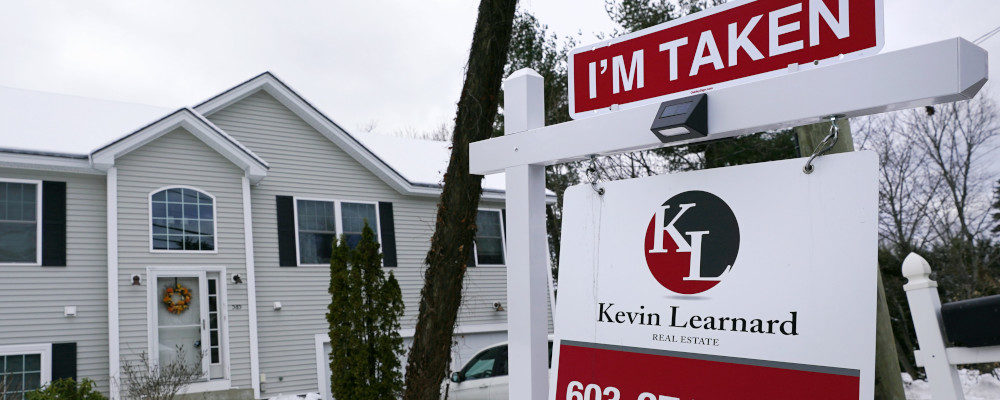One of the most significant economic effects of the pandemic has been the explosion it has helped drive in the Canadian real estate market.
Since the start of the pandemic the average home price has jumped 32 percent. It’s great news if you already own a home, but if you’re among the roughly 1 in 3 Canadian households who isn’t a homeowner, your prospects of ever getting on the housing ladder look increasingly bleak.
A recent RBC housing poll found 36 percent of Canadians under 40 have given up on owning a home and 62 percent of all Canadians surveyed think the majority of people will be priced out of the country’s market in the next decade.
MORE SIGNAL. LESS NOISE. THE HUB NEWSLETTER.
More importantly, plenty of young people who still aspire to home ownership are in for a rude awakening. Nearly half of people planning to buy a home had a budget of less than $500,000. The average price of a home in Canada was $678,091 as of February 2021, according to the Canadian Real Estate Association. In British Columbia the average price goes up to $887,695 and $864,159 in Ontario.
Canada is headed for a future where home ownership becomes a new kind of bourgeois aristocracy, with the bank of mom and dad becoming the dividing line between the young Canadians who can and can’t afford to buy a house. Perhaps counterintuitively, it’s Canadian conservatives who should be especially concerned about this, and big-C conservative governments need to be the ones who take bold action to address it.
Why? After all, conservative party voters and conservatism more broadly is dominated by older homeowners. These are the people who benefit from skyrocketing house prices.
Well, because the kind of bifurcated and deeply unequal society we are creating is one in which there will be a large group of people who have nothing to conserve, and whose life experiences will make them unlikely to slowly drift towards conservatism over their lifespan. In short, what’s good for conservative parties today may make them irrelevant in a few decades.
Conservatives don’t tend to do very well among young people. This doesn’t mean there aren’t young conservatives, but there’s a clear relationship between age and conservatism, or lack thereof. What’s the reason for this? It’s not because people all of a sudden find time to sit down and read Edmund Burke. It’s because their lives change as they age, or so the story goes. They get married, start paying taxes, buy a house, have children, and settle down.
These life events give people skin in the game. They have something to conserve, which naturally over time makes them more dispositionally, and often more politically, conservative. People tend to overstate this, but there’s definitely something to this line of thinking.
What’s good for conservative parties today may make them irrelevant in a few decades.
Astute conservatives have long recognized this. The idea of a “property-owning democracy” was coined by a British Conservative (technically a Unionist) MP, Noel Skelton, in 1923. Skelton’s insight was that democratic reforms might have delivered political rights to the masses, but there was no extension of these rights into the economic realm and this was creating instability. Skelton’s solution was to massively expand the property-owning class. Interestingly enough though, Skelton was actually referring to worker stakes in workplaces. But the idea remained part of Conservative discourse and it was Prime Minister Anthony Eden who tweaked it and turned it into an idea about mass home ownership.
The property owning democracy became a core of Tory politics in the postwar era, and in 1980 Margaret Thatcher’s government introduced the so-called “right to buy” scheme that gave millions of Britons the chance to buy their publicly owned housing at a discount. It was one of the cornerstones of Thatcherism and helped sweep Thatcher to power. The right to buy has its critics on the left who saw it (and still do) as an attack on public and social housing. But conservatives should not be afraid to make the case for home ownership. Someone has to own the housing we live in, better that people own their dwellings as much as is possible, rather than the government or landlords. It gives people something to conserve, and in time may turn them into conservatives. Thatcher recognized this and modern conservatives should too.
But there’s a bit more to all this than just “widespread home ownership means Conservative party domination.” Cost matters too. The least affordable cities and areas are not conservative bastions, quite the opposite. George Hawley, an academic at the University of Houston, has found that there is a clear relationship between housing costs and voting Republican. But the relationship he found is a revealing one. Affordable house prices is closely linked with voting Republican, and one of the key variables linking home values and voting Republican is marriage.
Hawley also found that the more median home prices increase, the more marriage rates decline among young women, which in turn pulls voters away from the Republican Party. What this paper suggests is that higher house prices may delay marriage.
The earlier people can buy houses the sooner they can get on with other things like marriage and family formation.
There are some clear intuitive political implications from this. Affordable house prices allow people to get on with their lives earlier. The earlier people can buy houses the sooner they can get on with other things like marriage and family formation. Unaffordable housing costs delay all these life experiences, with political consequences. Unmarried and childless urban renters are not exactly a growth demographic for conservatives, but unaffordable housing costs that keeps people in this position for longer or perhaps indefinitely will be disastrous for conservative parties.
Seeing that the only people who can afford to buy homes are ones lucky enough to have wealthy parents, will likely push people to the left. A Canada in which fewer and fewer people are married and have children is not one that produces moderate politics.
Unaffordable housing can only be made affordable if prices become affordable, which requires some tough choices to be made. What’s more important, protecting inflated equity of homeowners or reducing prices to make housing affordable, most likely through increasing supply? Conservatives probably choose the former, but they will be signing their own political death warrant if they do. The short term gains for their current base will lead to the long term erosion of any base at all.
Some Conservatives do indeed recognize this problem. Pierre Poilievre has been a lone voice calling for more housing to be built to deal with this problem, and has attacked the “gatekeepers” who put up barriers to this happening. Others simply shrug and say it’s ultimately a municipal problem, so there’s nothing Conservative governments can do about it. But this is wrong.
Cities are creatures of the provinces, and conservative governments like the current Ontario government could take aggressive action to increase supply, especially in urban areas where the pressures are highest. They could do this without having to worry about losing these urban seats or alienating their voters, given that the current Ontario PC coalition is not primarily an urban Toronto or Ottawa coalition.
Similarly, the federal government sends lots of money and to cities and provinces. Attaching conditionalities on this funding to require the loosening of zoning restrictions and the construction of more housing could be an effective tool the federal government could wield to solve this problem.
The present situation is an existential peril to conservatism as a political and social force. Conservatives have a choice: work to get new housing built to ensure the next generation is not locked out of home ownership and start producing a new generation of people with a stake in society and something to conserve or face political extinction.




